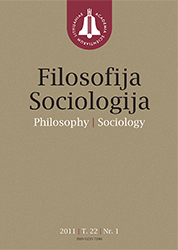Jeremy Benthamas: galimai didesnės laimės galimai didžiausiam žmonių skaičiui siekis kaip modus vivendi
Jeremy Bentham: The Ideal of the Greatest Happiness for the Greatest Number of People as a Modus Vivendi
Author(s): Dalia EidukienėSubject(s): Education, Ethics / Practical Philosophy, Political Philosophy, 19th Century Philosophy, Philosophy of Law, Social Norms / Social Control
Published by: Lietuvos mokslų akademijos leidykla
Keywords: Utilitarianism; utility; happiness; pleasure; pain; morality; egoism; reasonable egoism; natural law; sympathy; antipathy; consciousness; freedom;
Summary/Abstract: The article describes the model developed by Jeremy Bentham (1748–1832), founder of English utilitarianism, for a way of life based on the principle of the greatest happiness for the greatest number of people. Bentham’s ideas are worthy of attention because they “helped to cast doubt on the validity of the ethical and political doctrines which held sway at the time, such as moral intuitiveness, social contract, state of nature and natural law.” It is an undeniable truth that Bentham’s counterarguments and the range of problems he elaborated occupied many moral and political philosophers of subsequent generations. Today as well the debate has not ended on the subject of Bentham’s theoretical legacy. The varied estimations of Bentham’s ideas are inescapable. But what is clear is that they fit perfectly within Western Europe’s contemporary cultural tradition, where society’s intellectual, social and political arrangement encourages one to seek life’s truths without skirting the eternal question of morality. Bentham treats the greatest happiness of the greatest number of people as the purpose of life, its moral criteria and the rationally organized form of being, which is formed by people’s actions, interests and inner preferences. Bentham’s utilitarianism of action identifies rationality as the essential moral quality and the condition for morality to exist. For him, morality is prior to action, in that moral intellect not only evaluates a utilitarian action according to its consequences, that is, according to how and how much it contributes to the increase in happiness, but also dictates certain rules of behaviour which depend on circumstantial utility and therefore acquire an ever changing meaning. In this way, Bentham treats material wellbeing as the basis for morality, noting that moral good becomes good only due to its capacity to produce physical wellbeing. Bentham asserted the relativity of moral norms, not taking any of their judgements as absolute. Bentham treats morality as a social product whereby the individual and society understand the ideal of the greatest happiness in the context of another’s interests. He grounds morality on arguments by reason, but morality is not an outcome of reasoning nor a simple calculation. Its origins lie in intelligent egoism, which is conscious of the utilitarian capacity to sacrifice on behalf of other people’s happiness. Bentham unjustifiably believes that an individual, consciously heeding society, with a guaranteed enthusiasm accepts and applies society’s dictated moral principles related to the pursuit of the greatest happiness. Such an enlightened interest is as if necessarily guaranteed by the modus vivendi of that state which seeks the greatest happiness. The lack of such motivation arises from the lack of education. Bentham’s person, though an independent, rational, passionless calculator of happiness, is not a free creator or a former of new meanings. Their rules for behaviour and their inner dynamics depend only on the utility of the situation. Thus Bentham as if dooms to inertia the society which seeks the greatest happiness through its most just regime. Such a society monitors the dynamics of life, sensitively reacts to all possible changes in reality, and responds to the challenges of an increasingly complex world. It aims at a useful social engineering and acts only as a catalyst of an evolutionary change.
Journal: Filosofija. Sociologija
- Issue Year: 2017
- Issue No: 1
- Page Range: 29-37
- Page Count: 9
- Language: Lithuanian

